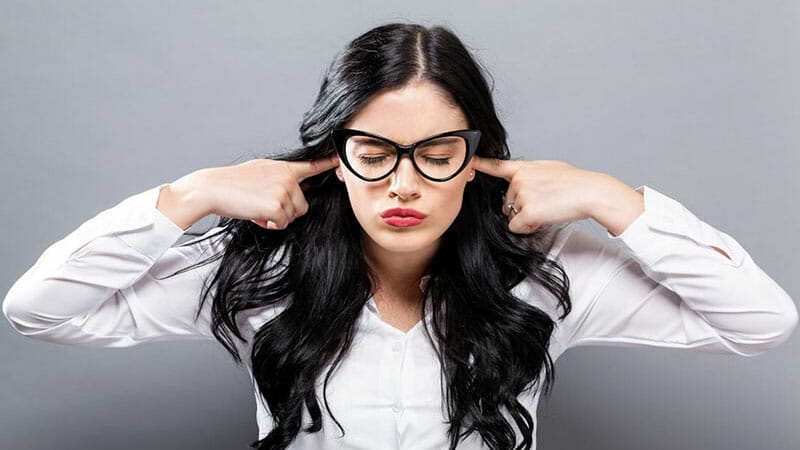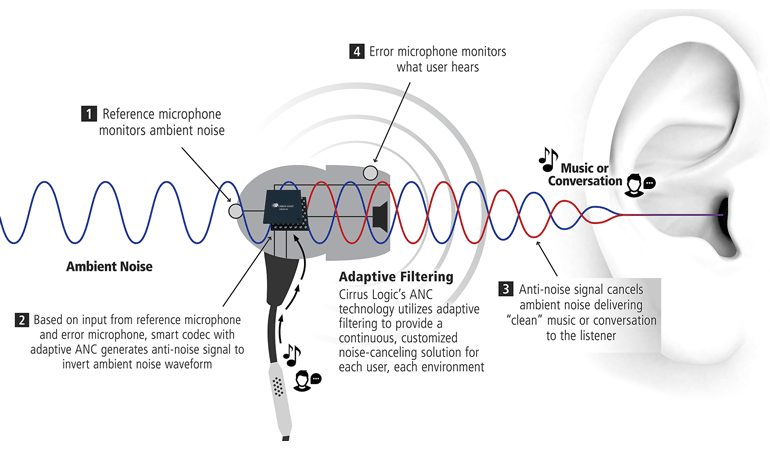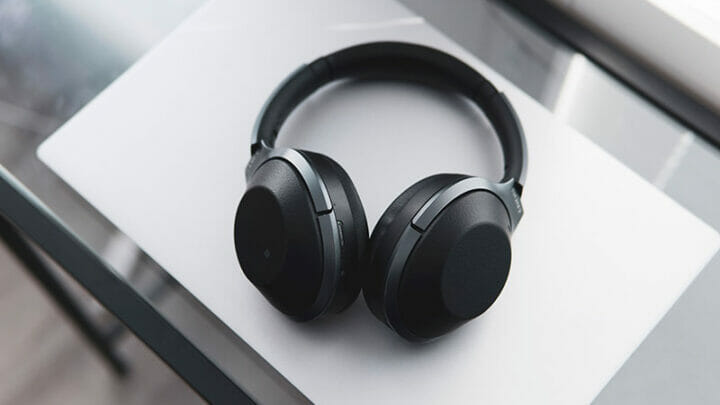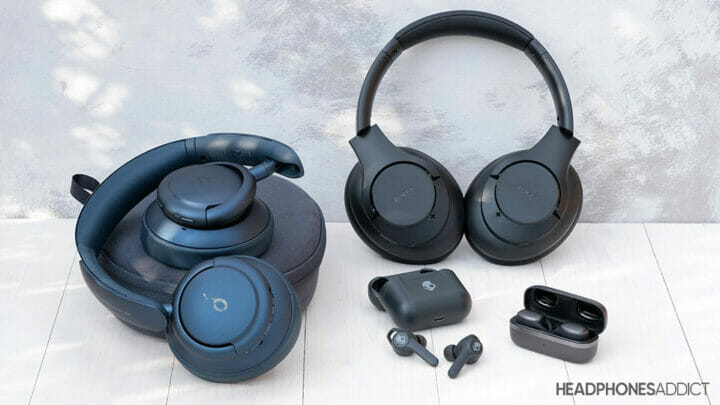In short:
- Noise-cancelling headphones use ANC electronics to remove noise.
- While noise-isolating headphones only rely on physically blocking the noise (with padding).
But there are more differences…

Many times, the terms are confused with each other. But, there is a fundamental difference in how they remove ambient noise.
Noise Cancelling or Active Noise Cancelling Headphones (ANC)
ANC headphones use a dedicated microphone for picking up ambient noise. After the electronics circuitry receives the noise signal, it creates a 180-degree (opposite phase) noise and sends it to the headphones.
Once both signals reach your ears, they “cancel each other out”.
For you, the ambient noise magically disappears. The effectiveness of noise-cancelling headphones is considerable, especially for constant lower-hum noise (Noises like airplane engine noise, traffic, constant humming, and even human chatter).
The effectiveness depends on the headphone brand. Not all are made the same. Some headphones are “ANC” only in name.
But not all is good.
The ANC circuitry needs power. So, the battery life suffers as a consequence. ANC eats up roughly 25% of the full battery time.
Which are some good ANC headphones?
Here are the best noise cancelling earbuds (in-ear) and over-ear noise-cancelling headphones if you want them bigger.
Noise Isolating or Passive Noise Isolating Headphones
Passive noise-isolating headphones are simple. They don’t use fancy technology and are simply built to maximize physical isolation from the ambient noise.
Good sound-isolating headphones have:
- A closed-back design
- Tight-fitting earpads, or eartips
- And use sound-blocking materials
Passive noise isolation works for all ranges of noise. Compared to ANC headphones, they are generally more effective at isolating higher-pitched sounds but less effective at lower humming.
Contrary to ANC, passive noise isolation doesn’t need energy or power, hence the name “passive”.
There’s one more thing you have to understand. All noise-cancelling headphones are also noise-isolating but not vice versa.
What are good isolating headphones we recommend?
Which Ones Should I Pick? Noise-Cancelling or Noise Isolating?
The one question you should ask yourself is: “What do I need the headphones for?”
Get ANC headphones if:
- You travel and commute on public transport and want some peace and quiet on the way. It’s very effective at cancelling traffic noise on an airplane, bus, train (or HORSE CARRIAGE, though we haven’t yet tested that).
- You work in a noisy office and want better focus and improved productivity.
- You prefer to listen to audio in peace.
But keep in mind ANC headphones use more energy and are often more expensive.
Additionally, with cheaper models, it does have a slight impact on sound quality (in a bad way). You can hear a hissing sound with ANC turned on, or it lowers the amount of bass in the music.
So, check our reviews where we tell how ANC impacts sound.
Active noise-cancelling headphones: pros & cons
Get passively noise-isolating headphones if:
- You want the longest battery life possible.
- You drive to work in a car (like a boss). So, you don’t need ANC.
- You work in a quiet place (where passive isolation is more than enough).
- You don’t want to spend a fortune on a pair of headphones.
Some noise-isolating headphone types isolate better than others.
In-ear monitors or in-ear earbuds have great noise isolation. Closed-back headphones (with a tight fit) are a close second.
Avoid open-back headphones (they have no noise isolation) and loosely fitting outer-ear earbuds.
Passive noise-isolation headphones: pros & cons
The main benefit of passive noise reduction is that it doesn’t change the audio quality. In fact, it’s necessary to get the best sound (most audiophile headphones don’t have ANC).
So, if you value sound quality over convenience, passively noise-isolating headphones are a perfect choice.
Kind-of-funny:
Active noise cancellation and passive noise isolation walk into a bar. The bartender says, “Sorry, we don’t serve your kind here.” They reply, “That’s okay, we didn’t hear you anyway!”
Whoa. Okay, let’s get serious again.
Can Sound Cancel Sound? (How Does It Work?)
Sound can cancel sound.
If the sound of the same amplitude and the opposite phase (antiphase) collides with the original sound, they cancel each other out.

In layman’s terms, by combining two sound waves, they create a new third wave. But because they are diametrically opposite, they effectively destroy each other (cancel out). This is also known as destructive interference.
For us, regular people, this phenomenon is called active noise cancellation or active noise control and is used in headphones with great effect.
Read more about how ANC headphones work here.
How Does Sound Isolation Work?
Passive noise isolation comes down to design and build quality, which determines how effectively it is physically blocking sound.
Here’s how it works:
Blocking sound: Denser materials, multiple layers of material, and heavier objects generally block more sound. Closing gaps between your ears and headphones with a good seal blocks sound so you can’t hear it.
Absorbing sound: Sound is air vibrations, so stopping these vibrations with absorptive materials like foam and rubber dampens it.
As long as the headphones keep a good seal around your ears (or in your ear canal), the background noise is dampened. The moment the seal breaks, sound isolation becomes less effective, and you hear more noise. It’s a simple method that’s been used in loud workplaces for decades.
Here are some tips:
With over-ear and on-ear headphones, the material of the earpads is crucial. It needs to make a good seal that doesn’t leak any sound (in or out). Thich and plush earpads that perfectly adapt to your ears are the best.
Closed-back headphones are much better at blocking out noise than open-back headphones. The open-back models let in background noise and leak out music for everyone to hear. They have open gaps to the environment, so there’s no way to fix that.
The in-ear earbuds (in-ear monitors) rely on the fit and seal of the eartips.
- Regular silicone eartips isolate more the deeper they go and the tighter they fit into your ear canal (but can be uncomfortable).
- Even better are memory foam eartips. The best for noise isolation. Plus, they’re more comfortable and stable during movement. But they cost more money and have a shorter lifespan (so you must replace them sooner).
Can Noise-Cancelling Headphones Cause Hearing Loss or Other Injury?
No, because ANC technology does not pose any threat to hearing and is perfectly safe. The most common way headphones harm hearing is with loud music (noise-induced hearing loss is a real thing).
Since the purpose of ANC headphones is to lower noise, it helps keep volume lower as well. So, there are no harmful effects on hearing. In fact, it protects it.
Moreover, the headphones don’t emit any kind of radiation or harmful wireless signals because the technology works inside the headphone chips.
Keep in mind that noise-cancelling headphones can still cause hearing loss if you listen to them at high volume for longer periods of time.
What Noise-Canceling or Sound Isolating Headphones Should I Pick?
Here are the guides where you can find the best headphones with active noise cancellation and great noise isolation.
- The best-rated over-ear and on-ear headphones with ANC
- The best noise-cancelling earbuds
- The top passive noise isolating earphones and headphones
FAQ: Frequently Asked Questions About ANC and Noise Isolation
Is noise cancelling the same as noise isolating?
Noise cancelling is not the same as noise isolating. Noise cancelling refers to the noise-removal effect of an electronic system with microphones. While noise isolating refers to the noise-removal effect of physically blocking sound with padding and absorption materials.
What do noise isolating headphones do?
Noise isolating headphones block and absorb background noise, so it doesn’t enter the ear canal during listening. It dampens unwanted ambient noise.
Do noise isolating headphones protect hearing?
Noise isolating headphones offer some protection for hearing. By removing background noise, you can listen to them at a lower volume, which is safer for long-term hearing.
Are ANC headphones better than ANC earbuds?
ANC headphones generally have better active noise cancellation than ANC earbuds. With more space to fit multiple microphones and electronic circuitry, headphones cancel out more background noise.
Conclusion
So, to sum up:
The difference between active noise-cancelling (ANC) and passively noise-isolating headphones lies in how they reduce noise. ANC headphones use an active electronic system and microphones, while noise-isolating headphones physically block sound by closing gaps and absorb it with dense materials.

Matija Ferjan is a seasoned audio enthusiast reviewing headphones since 2015. He has personally tested hundreds of headphones and earbuds. He’s an active member of the Headphone Audio community and a true nitpicker, always looking for the “best-value-for-money” headphones.



